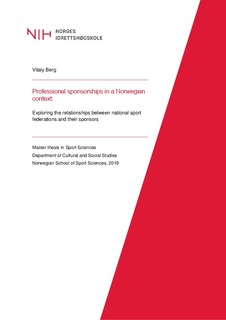| dc.description.abstract | The size of sport sponsorships has grown massively in recent years as a result of commercialization of the sport sector. Large national sport federations today get an increasingly significant portion of their income from sponsorships. At the same time, the sponsors have integrated strategic thinking into sponsorships. The relationships between sponsors and sponsees are evolving, and the literature has on several occasions recognized the need for investigating how these relationships operate in this new reality. Few studies have examined large sponsorships from a relational perspective, and none in a Norwegian context. It is therefore important to identify factors that contribute to a successful sponsor-sponsee relationship.
Using a case-study approach, this study examines the dyadic perspective of professional sponsorships. Twelve in-depth interviews are included in this case; four representatives from national sport federations, seven of their sponsors, and a marketing expert.
The findings demonstrate perceptual differences and similarities between sport federations and companies, and highlight the importance of a healthy relationship for sponsorship success. Several factors suggested by previous research are confirmed as important for relationship quality in professional sponsorships. They are cooperation, commitment, mutual understanding, satisfaction, and long-term perspective. At the same time, trust showed to be a less important factor. Further, the ability of partners to connect the sponsorship to several areas within their organization to achieve multiple benefits was also strongly present in the interviews. This is identified as a new relationship quality factor in professional sponsorships, called internal anchoring.
Additionally, the results show that sport federations and sponsors view the ideal relationship as a business-oriented, long-term partnership. However, for this to be a reality, sport federations must raise their competence in areas like marketing, social media, and business networking. The results also show that sponsorships partners ideally will have several additional attributes that contribute to sponsorship success, like shared values and media-friendly athletes. Consequently, theoretical and practical implications are discussed, and ideas for future research are suggested. | nb_NO |
